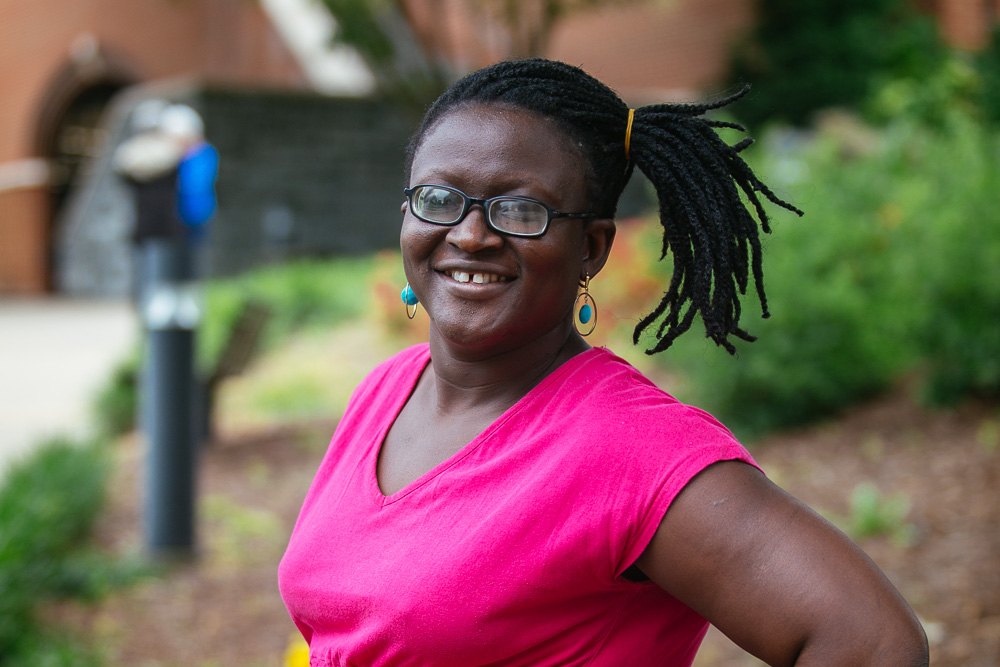Everyone leaves loved ones behind to come to the Summer Peacebuilding Institute at Eastern Mennonite University. However, gender-focused interfaith peacebuilder Theresa “Tessy” Gusim-Ndasule left an especially curious six-year-old son back in Nigeria who clearly intended to hold his mother accountable.
“Every day, we talk and he says, ‘Mom, how are your classmates today?’ and I say, ‘They are fine,’ and then he says, ‘Mom, what did you learn about peace today?” And then she gives a full report.
She also missed her daughter’s second birthday. But Gusim-Ndasule says her daughter will forgive her. “She’ll be happy when she grows up that I missed her second birthday because I was working in the pursuit of peace.”
Gusim-Ndasule’s “pursuit of peace” is partly because of a childhood tragedy she hopes her children will not experience. As a young girl, she lived among neighbors of different faiths, tribes and ethnic groups.
“I had many Muslim friends,” she said. “We went to school together and played together. I could perform the ablutions and I knew the call to prayer. My parents didn’t have a problem with it and neither did theirs, and it was that way until 1999, when everything changed. After that, Muslim people weren’t as free to have Christian friends and Christians too as it concerns Muslim friends because of the challenges and politicization of religion that has now polarized us. People you had grown up with became strangers almost like enemies.”
Peacebuilding a third career
Years later, working as a journalist during a time of intense Muslim-Christian conflict, Gusim-Ndasule witnessed dead bodies, burned homes, and the fear and mistrust among former friends.
These difficult memories motivated her to leave a long career in banking and begin working in conflict transformation. As a program officer involved with the Baptist Church and the Women’s Missionary Union, she focuses her efforts on facilitating dialogue with women of Muslim and Christian faiths in the city of Kaduna. To help her gain skills in this work, she was awarded one of two 2017 Winston Fellowships to attend the Summer Peacebuilding Institute.
The Winston Fellowship provides professional development for people who are relatively new to the peacebuilding field through a full-tuition scholarship that also covers travel expenses and lodging. To fulfill the fellowship’s requirement for post-SPI service and mentoring, Gusim-Ndasule plans to work with Carefronting Nigeria.
Gusim-Ndasule may be “new” to peacebuilding work herself, but she’s certainly been immersed in the concepts and the activity of peacebuilding for many years. She is married to Maji Peterx Ndasule, an experienced peacebuilder who works for Carefronting Nigeria. He is lead facilitator for the Alternatives to Violence Project (more popularly known as AVP) and the trauma consciousness and resilience program and has offered trainings around the world on a variety of peace-related topics.
‘The pain is too real’
At SPI, Gusim-Ndasule took a course in faith-based peacebuilding with Roy Hange and formation for peacebuilding practice with Professor Johonna Turner. A benefit of both courses was hearing from other people working on the same topics. She was particularly intrigued by the dialogue roundtables implemented by Elizabeth Krishna, from Fiji. “You don’t even need to address conflicts but you bring people together to ask them, ‘What does your faith say about this topic or that topic?’ I can see that working well.”
Gusim-Ndasule had particularly been looking forward to Strategies for Trauma Awareness and Resilience (STAR) training, her final course of the institute. She hopes to continue her training in the future with STAR II. While women can make an impact on interfaith violence, many are so troubled by trauma that they are unable to move forward. “They are not ready to talk to people on the other side of the conflict because the pain is too real. I wanted to learn what is happening to them and how they can begin to open up, to tell their story and to hear the stories of others.”
In the patriarchal Nigerian society, women are often less involved in decision-making yet are often the “the worst victims of these crises,” Gusim-Ndasule said. “Women have input as mothers, sisters, and wives. We have a strong influence on our children, our husbands and our siblings. I believe when women are allowed to speak and work out solutions, we may not get where we want to be, but it will move us along.”
Gusim-Ndasule hopes to train Christian and Muslim women together in conflict transformation skills and form a group to visit rural communities and Internally Displaced Persons camps. The sight of women of different faiths coming together to promote a culture of peace “will send a strong message to the women in the camps who are nursing grievances and holding onto grudges for what has been done to them.”
As she continues to think about ways to build trust, Gusim-Ndasule says she’s taking her experiences at SPI with her into that challenge. Participating in SPI has been “a blessing,” she says. “I’ve seen how the community here lives and nobody looks at you by who you are or where you come from. It’s the humanity that matters. That is something I am taking in and taking with me. You see a light in everyone, no matter your race, your gender, your faith.”
